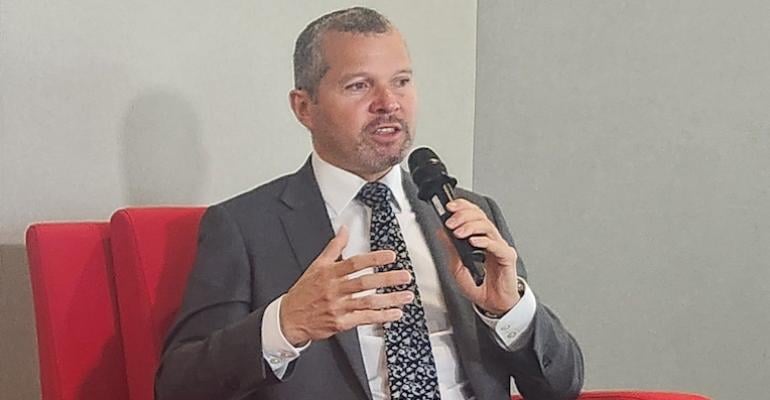Speaking at media briefing in Singapore on 19 April IMO Secretary-General Arsenio Dominguez expressed confidence that shipping would hit the 2030 target, the first of two checkpoints leading to an ambition of net zero emissions at or around 2050.
Earlier in the week S&P Global Commodity Insights’ Rahul Kapoor, Vice President, Global Head of Shipping Analytics & Research, cast doubt on the ability of the industry to meet the 2030 target based on alternative fuels availability.
Speaking at the Singapore Shipping Forum Kapoor noted that while container shipping companies had invested in alternative fuelled vessels the pace for other sectors such as tankers and dry bulk was much slower.
“In terms of our reference case…if you look at the 2030 numbers for alternative fuel you’re talking about 2%, hardly a dent, within that we have all these other important fuels, but unlikely it’s to be achieved, maybe due to the scale of the availability,” he told the conference organised by Moore Stephens and BNP Paribas.
IMO Secretary-General Dominguez took a broader view of how the target would be reached and based his on confidence on the commitment by member states and the industry to adopting energy efficiency measures and digitalisation to help achieve these efficiency gains. These combined with new fuels that had already been developed and engines that have been designed and are ready, and carbon pricing mechanisms under discussion at the UN body that governs the shipping industry.
“That's what gives me the confidence that we are on track and we are all moving towards the same direction. When we set out the targets for 2030 that was based on the information that we had at the time, with all the analysis that has been carried out,” Dominguez told the briefing arranged by the Maritme & Port Authorty of Singapore on the final day of Singapore Maritime Week.
He explained this included what member states have done, the industry, and all the measures that were put on the table.
Meanwhile Dominguez also said he was “very confident” that everything is on track for the IMO to agree carbon pricing measures in 2025 to incentivise the use of more significantly more expensive low and zero emission fuels.
“We're analysing 20 different scenarios, the proposals that we have on the table, and that takes time, it's quite an intricate analysis.” He explained a lot of work is being carried out between the MEPC held in March and the next meeting at the end of September in developing a framework.
Agreement was established last year to adopt technical and economic measures by the MEPC session in October 2025 with entry into force at the beginning of April 2027.
Copyright © 2024. All rights reserved. Seatrade, a trading name of Informa Markets (UK) Limited.
Add Seatrade Maritime News to your Google News feed.  |

